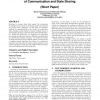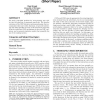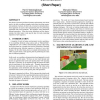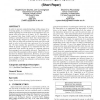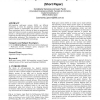117
Voted
ATAL
2008
Springer
2008
Springer
Efficient approximate inference in distributed Bayesian networks for MAS-based sensor interpretation
15 years 2 months ago
The multiply sectioned Bayesian network (MSBN) framework is the most studied approach for distributed Bayesian Network inference in an MAS setting. This paper describes a new fram...
117
Voted
ATAL
2008
Springer
15 years 2 months ago
2008
Springer
This paper presents the design and implementation of negotiation agents that negotiate with other entities for acquiring multiple resources. In our approach, agents utilize a time...
108
Voted
ATAL
2008
Springer
15 years 2 months ago
2008
Springer
Solutions to complex tasks often require the cooperation of multiple robots, however, developing multi-robot policies can present many challenges. In this work, we introduce teach...
79
Voted
ATAL
2008
Springer
15 years 2 months ago
2008
Springer
We study principled methods for incorporating user utility into the selection of sponsored search ads. We describe variations of the GSP allocation/pricing mechanism that accommod...
107
Voted
ATAL
2008
Springer
15 years 2 months ago
2008
Springer
We investigate equilibrium strategies for bidding agents that participate in multiple, simultaneous second-price auctions with perfect substitutes. For this setting, previous rese...
91
Voted
ATAL
2008
Springer
15 years 2 months ago
2008
Springer
This paper describes a proposal to build an intelligent feedback selection system for Virtual Reality-based training simulators. The system is aimed at generating multimodal feedb...
89
Voted
ATAL
2008
Springer
15 years 2 months ago
2008
Springer
For robots to become prevalent in human environments, the robots need to be able to perform complex tasks often involving sequential repetition of actions. In this work, we presen...
104
click to vote
ATAL
2008
Springer
15 years 2 months ago
2008
Springer
In order to prevent misunderstandings within groups of interacting agents, it is necessary to ensure that the agents' beliefs regarding the overall state of the interaction a...
76
Voted
ATAL
2008
Springer
15 years 2 months ago
2008
Springer
Self-organizing multi-agent systems (MAS) use different mechanisms to mimic the adaptation exhibited by complex systems situated in unpredictable and dynamic environments. These m...
47
Voted
ATAL
2008
Springer
15 years 2 months ago
2008
Springer

